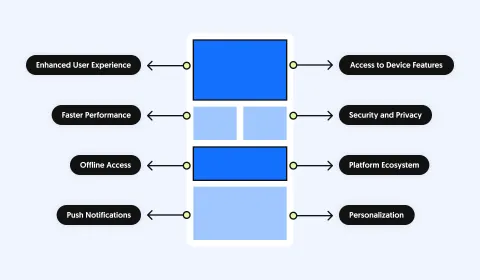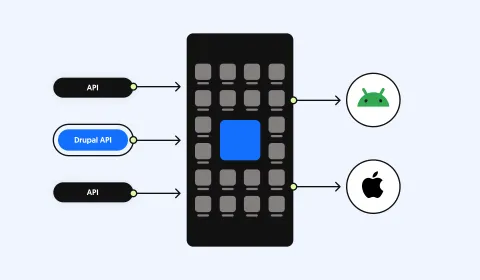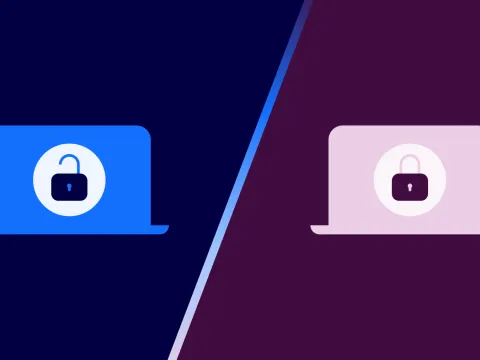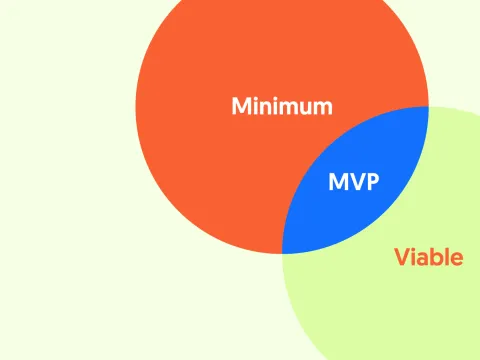Benefits of mobile apps for your business

Native apps have become increasingly popular for companies to provide a better experience for their users compared to what is possible with a regular website.
In this article, we explain why you would need a mobile application for your business and highlight the main benefits of mobile apps that can help you drive your business forward.
You will also gain an insight on how we at 1xINTERNET can help you create innovative, high-quality apps tailored to your business needs that deliver exceptional user experiences.
Why would you need a mobile app for your business?
There are many reasons why you would choose to create an app for your business. Mobile apps offer significant advantages when it comes to the user experience and improve customer retention and engagement.
Usually, the first interaction with users occurs on a website where they need to be persuaded to engage with the service provided. However, when these services require a certain amount of interaction, users usually look for an application in their mobile phones app store to ensure the best experience when interacting with the service provider.
Examples for interactions where users benefit from having a mobile app are:
- Enhanced user experience: Mobile apps offer a smoother and more intuitive interface optimised for touchscreens.
- Faster performance: Apps load quicker and provide smoother interactions, even on slower connections.
- Offline access: Many apps work without internet connection, allowing users to access content anytime, anywhere.
- Push notifications: Apps can send real-time alerts, keeping users engaged and informed.
- Access to device features: Apps utilize device features like camera and GPS for richer experiences.
- Security and privacy: Apps offer enhanced security features, protecting user data and privacy.
- Integration with platform ecosystem: Apps seamlessly connect with other services on the device.
- Personalization: Apps can tailor content and features based on user preferences, enhancing the user experience.

The benefits are described in more detail below. In summary, the benefits of a mobile application are to help building long-term relationships with customers.
Ultimately, the sole aim of mobile apps is to enhance the convenience of the customer's interaction with your services.
High-quality applications for our clients
At 1xINTERNET, we specialise in mobile app development. Our experienced team of designers, developers and project managers have executed many successful projects for clients across various industries.
We have vast experience in different types of native app projects such as marketing apps, commerce apps, and assistant apps both in B2C, B2B, and regular end user contexts.
Most of our apps seamlessly integrate with the websites we create using the API first web framework Drupal. This allows marketers to manage content, products, and access in one central place.
Some of our native apps have a large installed base (+1 Mio installations) and serve a substantial amount of content to their users. Others are highly focused and provide ultra personalised experiences.
When developing mobile apps we apply the same principles as for any other software development projects. After an idea validation and discovery phase we carefully plan the app. Development is done iteratively and we always try to deliver a fully functional MVP version of the app as early as possible. All our work is fully transparent and our clients participate actively in the development process using agile procedures.

What type of mobile applications we focus on
“Mobile apps”, often referred to as “native apps”, are applications that can be downloaded from an app store and installed directly on a mobile device. Due to their mobile-based nature, native apps have some unique features that web apps lack. For instance, they can access device-specific features, such as a mobile camera and use it for scanning functionality. Mobile apps also give you the option of sending push notifications to users. Push notifications are highly convenient for businesses as they serve as a new channel through which you can communicate with your customers.
Native apps possess the capability to store data locally on the device, eliminating the need for repeated retrieval upon app launch. As a result, these apps can function without a constant internet connection, offering faster performance and response times. For example, consider an app featuring a product catalogue where the information is stored directly on the device. The app incorporates a barcode scanning feature that instantly provides information about the corresponding product, even when offline.

Many businesses choose to combine web and native functionality and create “hybrid apps”. Hybrid apps are also mobile apps - downloaded from an app store. We love Drupal for many reasons, but one of them is that existing Drupal websites can serve as a backend for applications. Integration with APIs allows the app to pull content and information from the website and display it in the app through what is called an “in-app browser”. Hybrid apps look like native apps because the in-app browser looks seamless and users would not necessarily know that they are scrolling through a website. This saves a lot of time and money, because you can make use of already existing technologies.
Cross-platform app development
We use React Native for cross-platform development. React Native is a leading frontend technology in native app development and is based on the widely popular, open-source JavaScript library, React. React Native is a framework that is actively maintained by a community of contributors, which ensures continuous updates and improvements. Various large companies, such as Facebook, AirBnB and UberEats have used React Native for their mobile app development.
One of the main advantages of using React Native is its cross-compatibility. Developers can create a single codebase and use it for multiple platforms, for example, iOS and Android. This saves a lot of time in development, and cost is reduced significantly.
Deepdive into benefits of mobile apps
As previously mentioned, mobile applications offer many advantages. An app can serve as a platform where your customers can access all the information they need, browse through and purchase your services, and communicate with you.
Faster performance
Mobile apps typically load faster and provide quicker access to content compared to websites, especially when accessed on slower mobile data connections. This is because apps can store data locally on the device and utilise native features for faster rendering and responsiveness.
Offline access
Unlike websites, many mobile apps offer offline functionality, allowing users to access certain features or content even without an internet connection. This can be particularly useful for tasks such as reading articles, checking emails, or using productivity apps while travelling or in areas with limited connectivity.
Push notifications
Mobile apps can send push notifications to users, alerting them about important updates, messages, or events even when the app is not actively in use. This real-time communication helps to keep users engaged and informed, leading to higher retention rates and improved user engagement compared to websites.
Integration with platform ecosystem
Mobile apps seamlessly integrate with other apps and services on the device, providing a more cohesive and interconnected user experience. For example, users can easily share content from apps to social media platforms, access files stored in cloud storage services, or sync data across multiple devices.
Access to device features
Mobile apps have access to a device's hardware and software features, such as camera, GPS, accelerometer, and contacts. This allows apps to provide more personalised and interactive experiences, such as using location-based services, accessing the camera for photo uploads, or integrating with other apps on the device.
Security and privacy
Mobile apps can offer enhanced security and privacy features compared to websites, such as biometric authentication (e.g., fingerprint or face recognition), encrypted data storage, and app sandboxing. This helps to protect user data and sensitive information, providing users with a greater sense of trust and confidence in using the app.
Native app project highlights
Transgourmet - multisite and headless e-commerce

Eldum Rétt - complex e-commerce system

By taking advantage of mobile technology, businesses can unlock new opportunities for growth, differentiation, and success. If you haven't already invested in a mobile app for your business, now is the time to seize the opportunity and we´re here to help.
Other highlights
Why choose open source over proprietary software for enterprise projects

We often get asked what open source software is and why companies prefer it over proprietary...
Using a MVP approach for web projects

At 1xINTERNET we use a MVP (Minimum Viable Product) approach for delivering successful web projects...